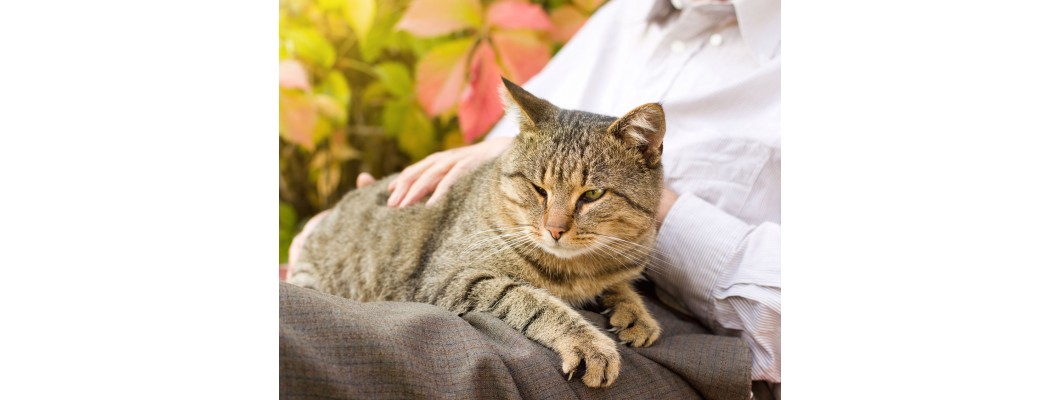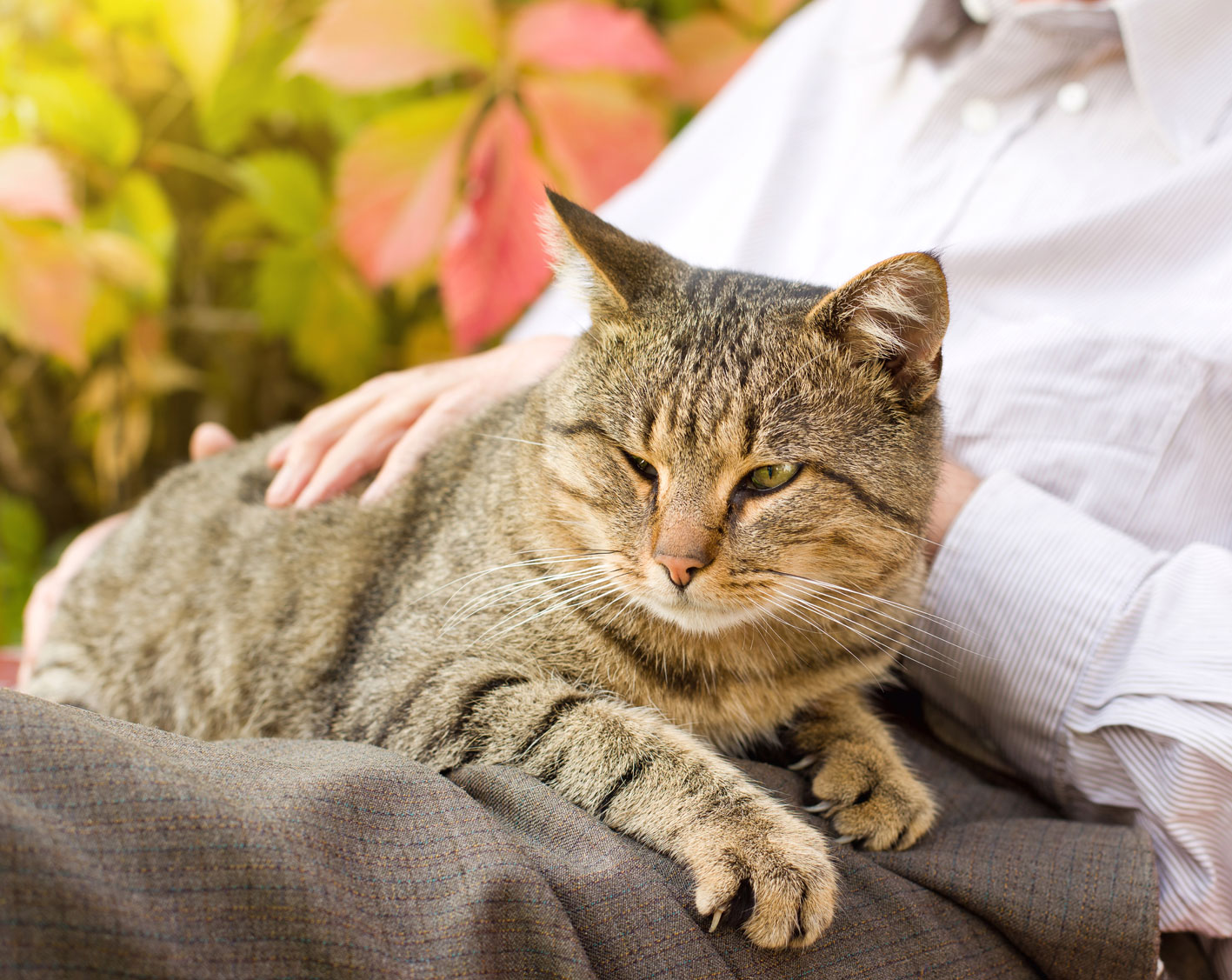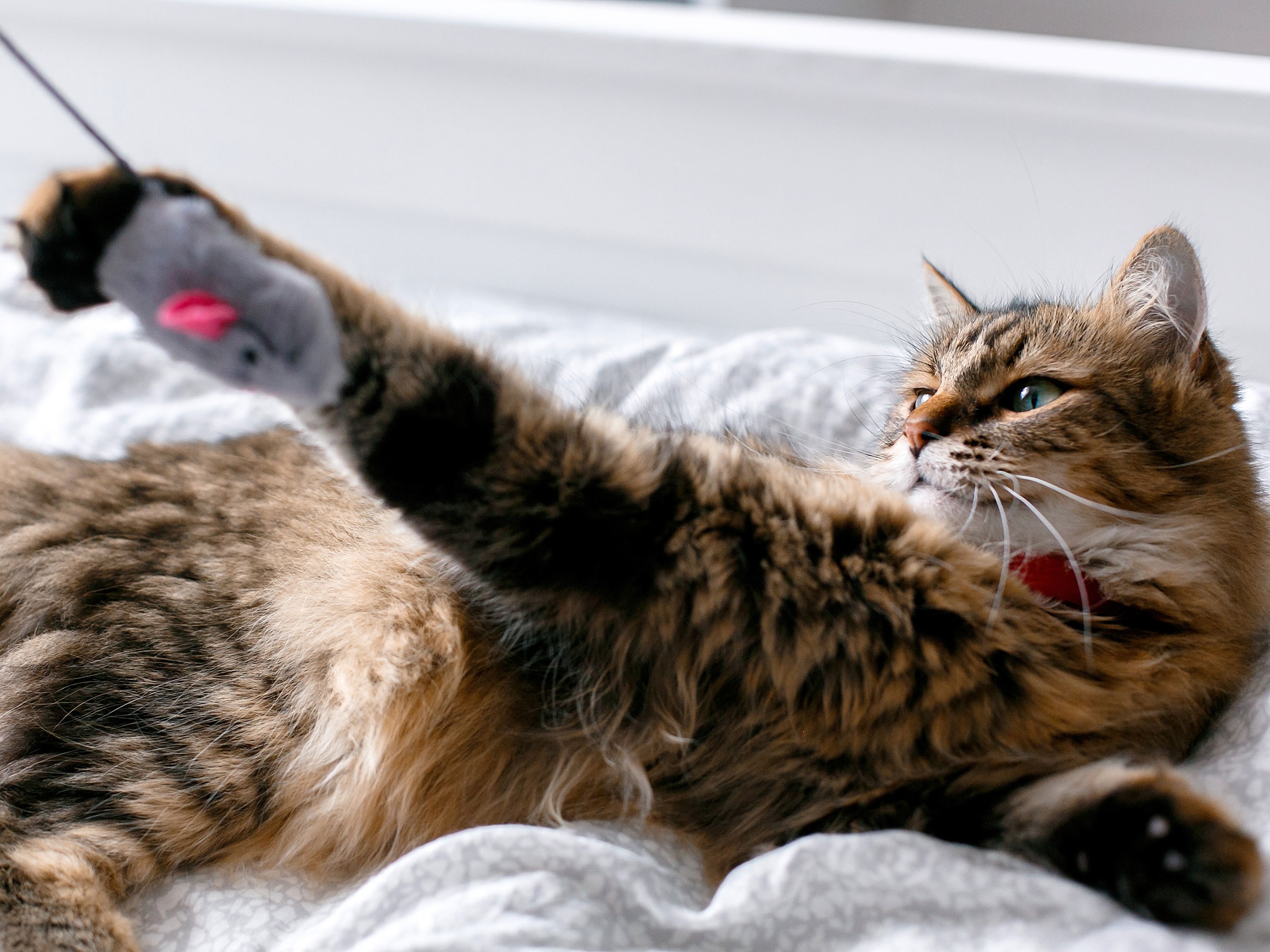
Cat needs appropriate care for each stage of life. Upon reaching old age, the cat has new needs and desires, which is why it is essential to pay increased attention to your kitty's care during its aging.

That’s why today you will learn how to care for a cat in old age, and we will answer the most common questions:
At what age a cat is considered a senior?
Why is my elderly cat losing weight?
Do cats in old age sleep more?
What vitamins do senior cats need?
Is it a good idea to get a kitten if already have an older feline friend?
How do I know if my elderly cat is suffering?
How can I get my senior cat to exercise?
At what age a cat is considered a senior?
In seven years, the activity of the body's cells decreases. Various organs do not work as effectively. Veterinary classifications of the cat's age are:
• At 7 to 10 years old, the cat is considered mature.
• At 11 to 14 years, a cat is considered elderly.
• Over 15 years, a cat is considered very old.
Cats often live to 20 years, which is 96 years by human standards.
There are common features of the aging process. The cat's sense of smell, taste, and hearing are dulled. The animal's appetite can change and decrease. Appetite may also decrease due to dental problems (such as tooth abrasion or gum disease). The combination of these problems can be the cause of weight loss.
"Compared to younger cats, the immune system of older cats is less able to fend off foreign invaders. Chronic diseases often associated with aging can impair immune function even further," says the Cornell University College of Veterinary Medicine.
The cat joints perform their function worse and develop osteoarthritis, which can cause severe pain and restrict mobility. The loss of flexibility also affects the cat's ability to lick its fur, which worsens the condition of the coat and skin. The fur may become thinner, and you may notice a deterioration in its condition. This is because the sebaceous glands that nourish the skin work less efficiently.
Some metabolic processes, such as digestion, also change as the cat's ability to process fats and proteins deteriorates as it ages.
Feeding cats while get older
 About 40% of a cat’s life falls during the period of old age. Therefore, the cat's parents must understand changes in the pet's food preferences.
About 40% of a cat’s life falls during the period of old age. Therefore, the cat's parents must understand changes in the pet's food preferences.
During this period, the cat's metabolic rate slows significantly, and your pet needs fewer calories. This circumstance should undoubtedly be considered when forming any senior cat's diet. It is extremely important to ensure you do not overfeed your pet.
Food specially designed for elderly cats will give your pet all the necessary elements. It contains a protein that the body can easily absorb, making it easier to chew and digest in the cat's stomach.
When feeding a senior cat, you should follow the guidelines for determining the portion size, which is on the product package. However, do not forget that this guide provides only general recommendations about the correct diet. Each cat needs an individual approach, so try to give your kitty enough food to maintain its activity and good physical shape.
Why is my elderly cat losing weight?
Older cats can suffer from a lack of weight. This is because as the general state of health and organs deteriorates, the cat gradually loses its appetite and dislikes the taste and smell of food. Another reason for weight loss can be a metabolic disorder and improper digestive system functioning. If your pet has lost appetite, you should contact your veterinarian as soon as possible, as these symptoms may strongly indicate that the cat has serious health problems.
If the veterinarian is sure that there are no medical reasons for your feline friend's loss of appetite, you can change the situation. For example, heat your cat's food to room temperature or add a little flavor to it, such as a spoonful of tuna. To restore your pet's appetite, you can diversify its diet. Make sure that the cat can easily access the food. This is especially important if an elderly pet has certain problems with orientation in space and movement.
Remember, before making any changes to a senior cat's diet, consult with a veterinarian. They will help you decide on the optimal and most balanced diet for your pet and give valuable recommendations on the best and easiest way to change it.
Why is my cat vomiting?
In healthy cats, vomiting occurs periodically. The cause may be because the food has caused an upset bowel. However, the animal's health risk occurs when the vomiting does not stop, and the vomit contains mainly bile (yellow or white foam). It is extremely important to immediately contact a veterinary clinic if this happens to your cat.
Vomiting in a cat can have a simple cause that does not need to be examined by a veterinarian, but it can also be a serious illness symptom.
There can be many causes of vomiting, and identifying the one that caused your cat to vomit can be a daunting task. Always follow the recommendations of your veterinarian. For successful treatment, you must give medications on time and prescribe therapeutic food even if the symptoms have stopped.
Do cats in old age sleep more?
 The elderly cats can sleep less, as they are generally less mobile. A slower metabolism leads to less need for rest.
The elderly cats can sleep less, as they are generally less mobile. A slower metabolism leads to less need for rest.
Some cats can sleep longer. However, in old age, their sleep may be less deep. As ThePets experts research, this can disrupt the daily routine and cause behavioral problems. Therefore, it is important to choose the right cat bed for cats in old age.
Why do older cats yowl?
The cat's desire to constantly yowl can be caused by a behavioral disorder or a physical illness symptom (hyperthyroidism).
An elderly cat may be afraid and need attention. Older cats may yowl or howl due to cognitive disorders. If you are faced with this, you first need to have a complete veterinary examination of the pet.
What vitamins do senior cats need?

Vitamins for older cats must contain substances that will strengthen muscles, joints, and cartilage tissue. For this purpose, vitamins of groups A, B, C, E, and calcium, magnesium, potassium, and copper are best suited.
• Vitamin A helps preserve vision, promotes tissue repair, and strengthens the immune response.
• Vitamin E is beneficial for the skin, accelerates regeneration, and has antioxidant properties.
• B vitamins can strengthen the nervous system and improve the condition of the skin and fur.
• Vitamin C can strengthen the immune system and the body's natural defense against infections.
However, it should be remembered that vitamins for older cats should be selected considering the individual characteristics of the kitty. Also, do not overfeed the cat with supplements; this is fraught with hypervitaminosis.
Is it a good idea to get a kitten if already have an older feline friend?
The ideal age for the common adaptation of two cats in the house is up to three years. Making friends is much more challenging for an adult cat than a kitten. The older cat will find it increasingly difficult to accept new living conditions. Of course, cats are incredibly jealous of their territory and personal life.
When you have a new pet, you must give your first cat the same amount of attention, or better yet, more than usual. You must let the kitty know that you still love it. The cat should be confident in you and your attitude; this will help reduce the intensity of passion and win over the cat so that it will accept a new pet.
The main thing is to find the right approach to how an adult cat can make friends with a kitten, and your pet will live a new and friendly life.
How do I know if my elderly cat is suffering?
Generally, cats hide illnesses by limiting their mobility or activity instead of showing signs of pain. Therefore, it is essential to pay attention to any changes, such as refusal to eat or play and consult a veterinarian promptly if there are concerns.
The following symptoms may indicate the presence of cat disease:
• Loss of appetite, weight.
• Frequent urination.
• Lameness and reduced activity.
• Disorientation, anxiety.
You must visit a veterinarian regularly. Any serious diseases can be detected at the initial stage. It provides a cat’s well-being.
Do senior cats like to play?
 It is important to play with an elderly cat every day to ensure the necessary activity level. You can use different toys that your cat may like:
It is important to play with an elderly cat every day to ensure the necessary activity level. You can use different toys that your cat may like:
• A stick with feathers to chase after.
• Toys for cats with catnip.
• Puzzle toys with treats.
Set aside time to play every day. Cats are independent creatures, and some may snort at your suggestion to exercise, especially if they are elderly and have arthritis. However, if you trick an elderly cat into playing, it will get much-needed daily activity through a few quick runs around the house.
Is catnip OK for adult cats?
Approximately 30% of adult cats do not react to catnip, which is completely normal. Sensitivity to the plant is usually inherited. If a kitten's mom or dad loved catnip, he will likely follow their example.
For a healthy cat, catnip is absolutely safe. It is not addictive and has no side effects. However, with nervous system disorders or an overly emotional reaction, it is better to keep the miracle grass away from the cat.
How can I get my senior cat to exercise?
When an older cat's activity decreases, they begin to walk more slowly, jump with caution, and play a little less. Although this behavior is normal for mature cats, these changes can worry their owners. One way to keep your cat awake is to stimulate her physical activity so that her brain and body remain mobile and flexible.
Cats love to climb, but older pets suffering from arthritis may have movement problems if they don't practice regularly. Ensure that your cat can easily jump on the furniture before lying down on the sofa and taking a nap. If you already have a cat house, motivate the cat to use it by hiding treats at different levels so that it has to jump to get to the snack.
The more care, affection, and attention an elderly pet is surrounded by, and the more responsibly the owner approaches its nutrition and conditions of maintenance, the fewer problems arise with managing the cat's behavior and health.



10 Comment(s)
My cat isn’t that old, but she’s close. Love my kitty.
Yes I agree!
Our cat is 8. We have a routine that when I get home from work, I chase her into the living room. She throws herself on the floor, and I get down to "attack" her, but let her attack my arm instead. It gets her moving, so it's a small price to pay.
Cool!
Kitties are great to have at all ages. I have had many and love them when they're older just as much as when they're kittens. They're all sweet.
I found this article about care of senior cats beneficial. My first cat lived to be 20 years old and I wish I had read this article years ago. The article described the loss of appetite and food finickiness that my cat exhibited.
I have several seniors and when some of them started going outside the box I realized I had to start using "dog" litter boxes - they're very low profile - and I use newspaper litter pellets in those boxes. Old hips just didn't like getting in the taller boxes - even though the entries aren't that tall
Thanks for the informative article. I hope my cat never grows old. Wishful thinking.
my cat lovvveeess feather sticks! She is also loving the new multivitamin called balanced breed that I have been giving her to help her through her senior years
I think that my senior cat needs some extra vitamins because her coat isn't shiny, and I think her nails are a bit more brittle. Thanks for mentioning that Vitamin E is beneficial for skin health. I'll take my cat to the vet this week to see if more vitamins would help her.
Leave a Comment